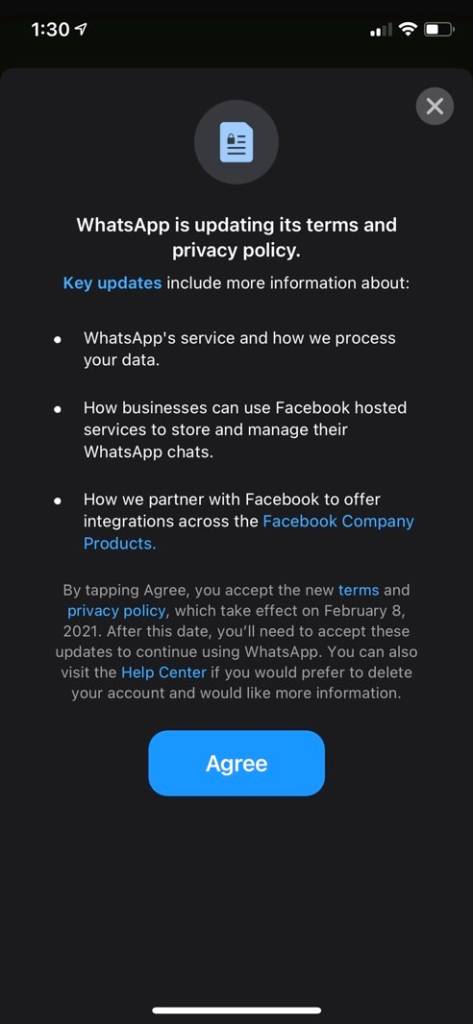Facebook Practically Forces WhatsApp Users To Share Data With Facebook
- WhatsApp's new privacy policy will force users to agree to share data with Facebook. There's no opt-out available this time.
- Facebook tried to link WhatsApp and Facebook profiles before but gave users a way to opt out of the feature.
- Facebook promised not to connect WhatsApp and Facebook accounts when it purchased the chat app in 2014.
When Facebook announced plans to purchase WhatsApp several years ago, it promised not to link user data between the two services. It turned out to be a lie, as Facebook initiated a process to link accounts just two years later. Facebook was fined for it in Europe, but it didn't really matter. At the time, users were able to opt out of the data sharing process. Fast forward to early 2021, a few weeks after Facebook launched a massive attack against Apple's newest privacy features, and Facebook wants to collect even more user data. The company is practically forcing WhatsApp users to share data with WhatsApp. There's no real alternative to opt out from the feature this time around. The only thing you can do is quit WhatsApp completely. And it's all happening in the midst of a massive health crisis where apps like WhatsApp are critical for communication.
WhatsApp users may have noticed the following prompt in the app, informing them that WhatsApp is updating its terms and privacy policy. The privacy update will take effect on February 8th, and the only button you can press is Agree.

Screenshot from the iPhone WhatsApp application shows the new privacy policy warning users have started seeing.
If you disagree, you can't opt out, as Facebook explains. After February 8th, "you'll need to accept these updated to continue using WhatsApp."
Here's the WhatsApp data shared with Facebook once you agree to the new terms, via xda-developers.
"The information we share with the other Facebook Companies includes your account registration information (such as your phone number), transaction data, service-related information, information on how you interact with others (including businesses) when using our Services, mobile device information, your IP address, and may include other information identified in the Privacy Policy section entitled 'Information We Collect' or obtained upon notice to you or based on your consent."
The WhatsApp privacy policy is available at this link. It explains, among other things, how WhatsApp works with other Facebook companies.
As part of the Facebook Companies, WhatsApp receives information from, and shares information (see here) with, the other Facebook Companies. We may use the information we receive from them, and they may use the information we share with them, to help operate, provide, improve, understand, customize, support, and market our Services and their offerings, including the Facebook Company Products. This includes:
- helping improve infrastructure and delivery systems;
- understanding how our Services or theirs are used;
- promoting safety, security and integrity across the Facebook Company Products, e.g., securing systems and fighting spam, threats, abuse, or infringement activities;
- improving their services and your experiences using them, such as making suggestions for you (for example, of friends or group connections, or of interesting content), personalizing features and content, helping you complete purchases and transactions, and showing relevant offers and ads across the Facebook Company Products; and
- providing integrations which enable you to connect your WhatsApp experiences with other Facebook Company Products. For example, allowing you to connect your Facebook Pay account to pay for things on WhatsApp or enabling you to chat with your friends on other Facebook Company Products, such as Portal, by connecting your WhatsApp account.
Unsurprisingly, personalization and ads came up in the list of reasons for data sharing. Facebook did pay nearly $20 billion for WhatsApp, and it needs to make money off it. It might not place annoying ads in WhatsApp, but connecting WhatsApp to Facebook and Instagram would allow it to gather even more data about users.
WhatsApp will continue to remain end-to-end encrypted, and the app doesn't collect as much data as Facebook Messenger does.
If there is one good reason to offer users some way to link all their Facebook properties, that's the mythical end-to-end encrypted chat app that will unify Messenger, Instagram, and WhatsApp. It's unclear when that will happen, as Facebook has only linked Messenger and Instagram chats so far. Facebook's decision to start linking WhatsApp with Facebook this early isn't any less annoying.
The other way you could fight back is by deleting your Facebook profile. But Facebook collects data from non-Facebook account holders as well.
